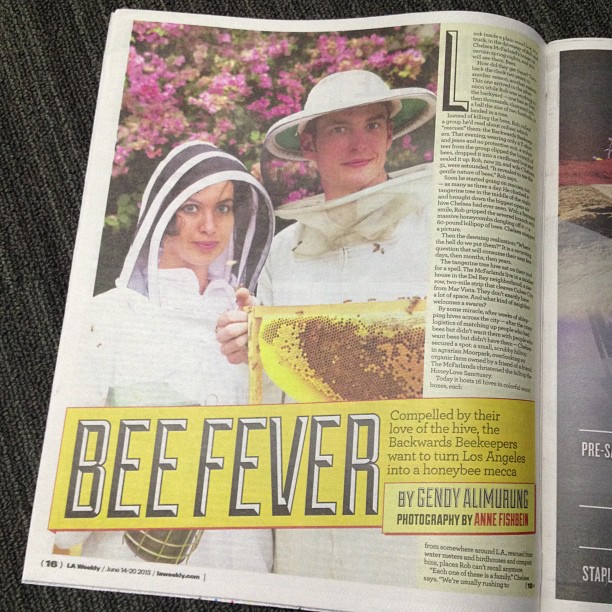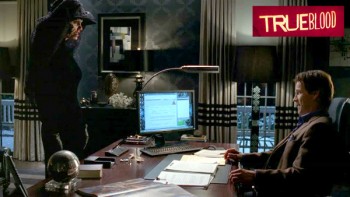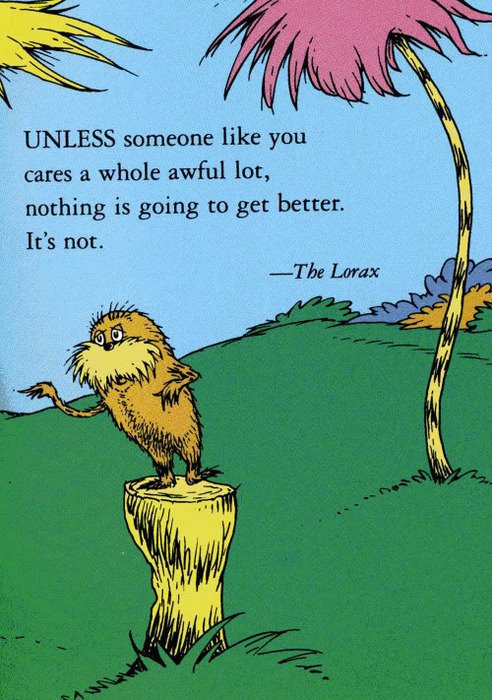By Gendy Alimurung

Look inside a plain wood box, in a truck, in the driveway of Rob and Chelsea McFarland’s house on certain spring nights, and you will see them. Bees.
How did they get there? Turn back the clock two years, to another season, another swarm. This one arrived in the afternoon while Rob was working in the backyard — one bee at first, then thousands, clustered into a ball the size of two footballs. It landed in a tree.
Instead of killing the bees, Rob called a group he’d read about online, which “rescues” them: the Backwards Beekeepers. That evening, wearing only a T-shirt and jeans and no protective suit, a volunteer from the group clipped the branch of bees, dropped it into a cardboard box and sealed it up. Rob, now 33, and wife Chelsea, 31, were astounded. “It revealed to me the gentle nature of bees,” Rob says.
Soon he started going on rescues, too — as many as three a day. He climbed a tangerine tree in the middle of the night and brought down the biggest open-air hive Chelsea had ever seen. With a frenzied smile, Rob gripped the severed branch with massive honeycombs dangling off it — a 60-pound lollipop of bees. Chelsea snapped a picture.
Then the dawning realization: “Where the hell do we put them?” It is a recurring question that will consume their next few days, then months, then years.
The tangerine tree hive sat on their roof for a spell. The McFarlands live in a modest house in the Del Rey neighborhood, a narrow, two-mile strip that cleaves Culver City from Mar Vista. They don’t exactly have a lot of space. And what kind of neighbor welcomes a swarm?
By some miracle, after weeks of shlepping hives across the city — after the crazy logistics of matching up people who had bees but didn’t want them with people who want bees but didn’t have them — Chelsea secured a spot: a small, scrubby hilltop in agrarian Moorpark, overlooking an organic farm owned by a friend of a friend. The McFarlands christened the hilltop the HoneyLove Sanctuary.
Today it hosts 16 hives in colorful wood boxes, each from somewhere around L.A., rescued from water meters and birdhouses and compost bins, places Rob can’t recall anymore.
“Each one of these is a family,” Chelsea says. “We’re usually rushing to beat the exterminator out there.”
For the past two years, the McFarlands’ house has been a halfway home for rescued bees. Rob, a YouTube channel manager, rescues them after work in the evenings, and the bees spend the night in his truck on the driveway until he can shuttle them up to the hilltop in the morning.
You do not choose to become obsessed. As anyone who has ever fallen in love with this insect says, “The bees choose you.”
“We always kind of have bees at our place,” Chelsea admits, with a sheepish grin.

Commercial bees — the ones used to pollinate crops in the agriculture industry — are dying off in record numbers, presenting a serious crisis to global food production. Yet in urban areas, bees thrive. No pesticides or monocrops mean healthy living conditions. As improbable as it sounds, cities like Los Angeles may be the bees’ best hope for survival.
But there’s a catch.
Urban beekeeping is legal in New York, Seattle, Portland, Ore., Denver, Atlanta, San Francisco, Paris, London, Tokyo and Vancouver. In New York and San Francisco, people keep hives on the roofs of luxury hotels and apartment buildings.
In Los Angeles, however, bees exist in a legal gray area. The county allows them. But the city has no laws specifically pertaining to urban beekeeping. Currently, if bees are found on public property, the city’s only option is to exterminate them. As a result, the past few years have seen the emergence of groups like the Backwards Beekeepers, which are devoted to rescuing and keeping these wild swarms of so-called “feral” hives within city limits.
The Backwards Beekeepers represent a whole new kind of thinking about bees. While older, established groups frown on feral hives, the Backwards Beekeepers see them as the way of the future. Where traditional bee clubs use pesticides and antibiotics to help struggling bee populations, the Backwards Beekeepers favor organic, “natural” methods. The city, in a Backwards Beekeeper’s eyes, is a bee’s ideal stomping ground.
Yet as long as the rules about keeping hives on private property are anyone’s guess, beekeepers live in fear. No one has been prosecuted, but that doesn’t seem like security enough. And so Rob and Chelsea McFarland have been working to change the city’s codes one neighborhood group at a time.
When the McFarlands consulted beekeepers in Seattle, they were advised to build support from the ground up. So the McFarlands formed a nonprofit foundation, HoneyLove, and they do endless events and outreach: wax symposiums, honey tastings, mead workshops, pollen parties, art shows, festivals, concerts, garden tours, grocery consortiums, school visits, equipment demonstrations, film screenings, radio shows, television appearances, guest lectures and video blogging. They organized a four-month feasibility study with the Mar Vista Neighborhood Council, which includes surveys with residents, testimony from a pediatric pulmonologist on the effects of bee stings and, for a little bedtime reading, 75 scholarly articles on beekeeping.
In the process, their small social circle has become a massive one; the bees opened up a community for them in a way that nothing had before. “You’d be amazed at how many people have a particular interest in bees for one reason or another,” Rob says.
How does someone get into bees? For the McFarlands, the more salient question is, how did they manage so long without bees?
The couple is well versed in the art of taking up causes. Previously they championed orangutans. But orangutans were an abstraction, thousands of miles away in the forests of Borneo. Bees were literally right in their backyard.
Chelsea, a video editor and something of a natural-born cheerleader, wanted to fix their bad rep. “You see a swarm coming, and it’s, like, ‘Killer bees! Run for the hills!’?” she says. “But actually it’s the least aggressive a bee will ever be. Because they have nothing to defend. They’re all homeless. They have no honey. They have no babies.”
Rob, who is quiet and thoughtful, with a mind prone to drawing connections, saw the intrinsic fascination of the insect itself. There were infinite, engrossing facts to learn. Did you know that bees see in ultraviolet light, so flowers look like neon signs to them? Did you know that bees are essentially plants’ way of having sex?
Collecting signatures at the Mar Vista Farmers Market one morning, they meet Councilman Bill Rosendahl, who is there picking up greens for his turkeys and chickens and finches and cockatiels… [continue reading article via laweekly.com]


 follow
follow  watch
watch  subscribe
subscribe 



















 Become a member of HoneyLove and learn to be an urban beekeeper!
Become a member of HoneyLove and learn to be an urban beekeeper!
 Plant an organic garden without the pesticides that harm honeybees!
Plant an organic garden without the pesticides that harm honeybees!
 Provide a water source on your property – bees love clean water to drink!
Provide a water source on your property – bees love clean water to drink!